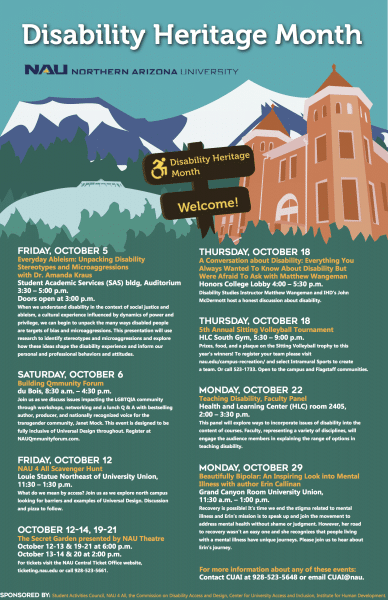October is here, which means it’s Disability Heritage Month at Northern Arizona University. Sponsored by the Student Activities Council, NAU 4 All, the Commission on Disability Access and Design, the Center for University Access and Inclusion and the Institute for Human Development, the month’s events include the annual Sitting Volleyball Tournament, an inclusive scavenger hunt, a faculty panel and presented talks highlighting different aspects of disability in everyday environments. The goal is to bring people together and normalize disability as a part of daily life by recognizing it as an aspect of diversity that can affect anyone at any time.
“At NAU, we hold a special place for Disability Heritage Month because of the way NAU acknowledges and embraces disability as a valuable constituent to diversity,” said Chris Lanterman, assistant professor in educational specialties for the College of Education. “This is one of the reasons NAU has a commission that is advisory to the Office of the President on matters related to disability at the university.”
The month kicks off with guest speaker Amanda Kraus delivering “Everyday Ableism: Unpacking Disability Stereotypes and Microaggressions” from 3-5 p.m. on Friday, Oct. 5, in the Student Academic Services auditorium. The presentation uses research to identify the verbal and nonverbal communications, intentional or unintentional, that get directed at people with disabilities and convey a derogatory or hostile message. Further, it explores the way this behavior affects the disability experience as well as personal or professional attitudes toward disability.
The topics Kraus highlights in the talk are in line with what NAU hopes to achieve in honoring Disability Heritage Month: inclusivity and respect for all members of the community, along with a balanced perspective on what disability does, and doesn’t mean.
Lanterman explained NAU’s choice of wording in “disability heritage” as an appreciation of the positive impact on society people with disabilities have had through important roles in science, politics, literature and more.
“Thus, ‘heritage’ reflects the value we hold for the contributions of people with disabilities to our world, as well as the respect we have for people with disabilities,” he said.
For a full schedule of events, see the flyer below. Campus maps are available online.



